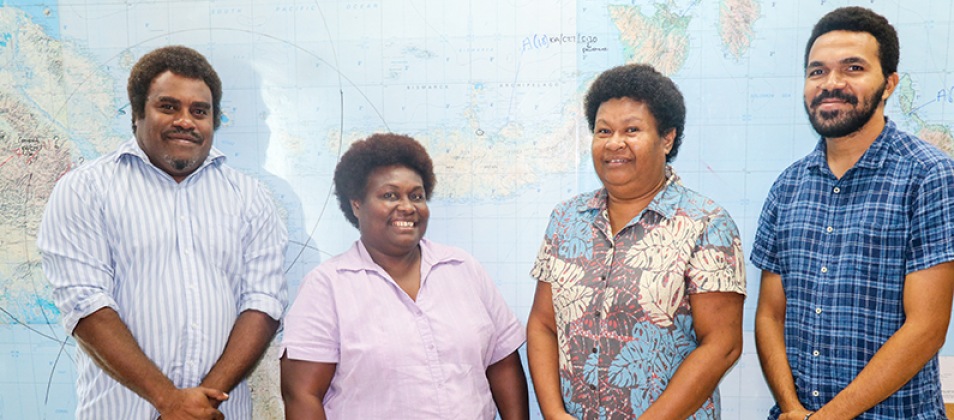
Papua New Guinea Develops Strategic Plan Ahead of 2022 National Election
PNGEC strategic planning core team members who designed and led the strategic planning process starting in October 2017: Training Manager Bale Kavanamur, Acting Director for Information and Community Awareness Alice Lupalau, Acting Director for Policy Kila Vaname, and Information and Communications Technology Support Officer Trevor Mallen (from left to right).
The Papua New Guinea Electoral Commission (PNGEC), with the support of the International Foundation for Electoral Systems (IFES), conducted its strategic planning process from October 2017 to March 2018 with the aim of developing its 2018-2022 Corporate Plan. The plan will guide the PNGEC over the next five years through its preparation for the 2022 national election and implementation of long-term civic education, inclusion and legal reform initiatives. The PNGEC strategic planning core team developed and designed the process focusing on eight key issue areas which became the PNGEC’s strategic pillars: legal framework, restructuring and decentralization, organizational capacity, financial management, voter enrollment, election management, voter awareness and civic education, and gender equity and social inclusion. Three-day workshops were conducted around each of these pillars in February and March. Participants were introduced to strategic planning concepts, building the capacity of the PNGEC, and used them in combination with lessons learned from the 2017 national election to develop five-year action plans.
The PNGEC strategic planning core team prioritized inclusion in the development of the process and created the most inclusive strategic planning process the PNGEC had ever conducted. Approximately 47 percent of PNGEC headquarters and provincial staff at all levels of seniority, 54 individuals in total, participated in the working groups and 41 percent of participants were women. This also represented the first time that local external stakeholders were engaged in the PNGEC’s strategic planning process, with representatives from the Young Women’s Christian Association, Caritas PNG and Papua New Guinea Governance Facility participating. The inclusion of external stakeholders was received positively on both sides and one civil society organization (CSO) representative noted that this was the first time this collaboration had occurred as CSOs previously were “invited to participate in an activity that is already designed – here we are working together.”
An assistant election manager noted that the inclusive nature of the workshop was effective because it “[set] the pace for young managers coming up from the field. We’ll be in a better position to do and implement these [activities].” Another provincial participant commented that the workshop “really [enhanced] our skills in the field to work with stakeholders and in our offices…our involvement in this, especially the provincial staff, is a bonus for us.”
The PNGEC 2018-2022 Corporate Plan is due to be finalized and launched in April 2018.
To view photos from the workshops, click here.
IFES’ work in Papua New Guinea is generously funded by the Australian Department of Foreign Affairs and Trade through the Electoral Systems Strengthening Project.










